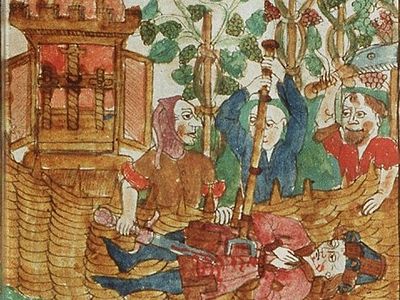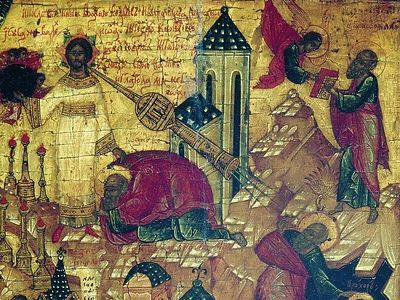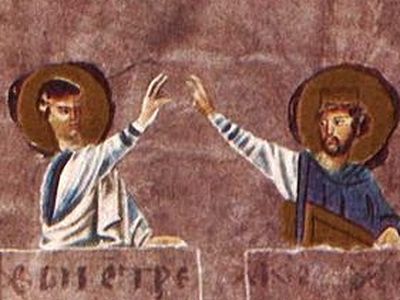Source: Orthodox Christian Network
October 17, 2016
So He came to a city of Samaria, called Sychar, near the field that Jacob gave to his son Joseph. Jacob’s well was there, and so Jesus, wearied as He was with His journey, sat down beside the well. It was about the sixth hour. There came a woman of Samaria to draw water. Jesus said to her, “Give me a drink.” For His disciples had gone away into the city to buy food. The Samaritan woman said to Him, “How is it that You, a Jew, ask a drink of me, a woman of Samaria?” For Jews have no dealings with Samaritans. Jesus answered her, “If you knew the gift of God, and who it is that is saying to you, ‘Give me a drink,’ you would have asked Him, and He would have given you living water.” John 4:5-10
Let us bow our heads to the Lord.
One of my favorite stories in the Bible is the story of the woman at the well, told in John 4. This story shows that Jesus was fully human, as He arrived at a well in the middle of the day and was thirsty from His journey. A woman of Samaria was sitting by the well. Jews and Samaritans were enemies and men didn’t associate freely with women, so when Jesus asked her for a drink from the well, He was breaking two social norms of the time. Naturally, the woman was somewhat suspect and cynical in her response to His request. After all, how is it that a Jewish man could ask a drink from a Samaritan woman?
Jesus answer was not only stunning, but it opened a dialogue between Him and the woman which led her to become the first person to share the Gospel with others. She went and told all the people in her town about Jesus, saying “Come see a man who told me all that I ever did. Can this be the Christ?” (John 4:29)
When people become cynical about the church, or people disparage the Gospel, Christianity, morality and the things related to faith and salvation, the answer of Christ often comes to my mind:If you KNEW the gift of God and who it is that is saying to you, ‘Give me a drink,’ you would have asked Him, and He would have given you living water.”
When the priest tells us in the Divine Liturgy, Let us bow our heads to the Lord, if we really understood the Lord and the Liturgy, we would not only bow down our heads, we would lay down prostrate before the Lord. After all, who is worthy to stand in His presence? Who is worthy of His forgiveness? Who is worthy to receive Him in the Eucharist? No one.
And if we really knew the gift of salvation, and the power of Jesus Christ to save souls and change lives, we wouldn’t want to leave the church at the end of the service. We certainly would not come late at the beginning. We wouldn’t want to miss a Sunday. If we really knew the gift of salvation offered to us in Holy Communion, it would really change our behavior, our focus, our entire life.
So, why doesn’t it work that way? Why isn’t the Divine Liturgy life-changing every time out? Why can’t we sustain our focus? The simple answer is, because we are human and we live in a fallen world. The life we live is a battle between the spiritual and the material. If you read the entire account of the woman at the well, John 4:5-42, you will see this battle in the dialogue between Jesus and the Samaritan Woman. After Jesus tells her “If you knew the gift of God, and who it is that is saying to you, ‘give me a drink’, you would have asked Him, and He would have given you living water,” (John 4:10) she returns a material response, “where do you get that living water?” (John 4:12)
Jesus tells her how “everyone who drinks of this water will thirst again but whoever drinks of the water that I shall give him will never thirst.” (John 4:13-14) The woman thinks of her material convenience and says to Jesus “Give me this water that I may not thirst, nor come here to draw.” (John 4:15) The dialogue eventually moves from the material to the spiritual as she eventually says to Jesus “I perceive you are a prophet” (John 4:19) and “I know that Messiah is coming (He who is called Christ); when He comes, He will show us all things.” (John 4:25). And then Jesus reveals Himself to her: “I who speak to you am He.” (John 4:26) After this the woman goes and become the first “evangelist”, as she spreads the good news.
To me, this line of the Divine Liturgy reminds me of the story of the Samaritan Woman. We may hear a command to “bow our heads to the Lord” and hope to hear a little bit of the inaudible prayer which follows. To me, I hear this line as a reminder that we are to bow our heads, our bodies, our lives to the Lord. We are to learn the “gift of God” so that we can partake of the “living water” (the Eucharist) and have it be life changing, so that it becomes for us “a spring of water welling up to eternal life.”(John 4:14)
Like the Samaritan Woman, we don’t completely know the gift of God. This is why it is important to stay in the dialogue—to continue praying, to continue worshipping, to continue learning—so that like the Samaritan Woman did eventually, our hearts can be completely converted to Christ, to living for Him, to sharing Him with others in our words and deeds.
As we read in James 4:10, “Humble yourselves before the Lord and He will exalt you.”
O come, let us sing to the Lord; let us make a joyful noise to the rock of our salvation! Let us come into His presence with thanksgiving; let us make a joyful noise to Him with songs of praise! For the Lord is a great God, and a great King above all gods. In His hand are the depths of the earth; the heights of the mountains are His also. The sea is His, for He made it; for His hands formed the dry land. O come, let us worship and bow down, let us kneel for the Lord, our Maker! For He is our God, and we are the people His pasture, and the sheep of His hand. O that today you would hearken to His voice! (Psalm 95: 1-7)
Bow down in prayer to the Lord today!
+Fr. Stavros
Visit our site each day to read the Daily Devotion!
Photo Credit: Angelfire




